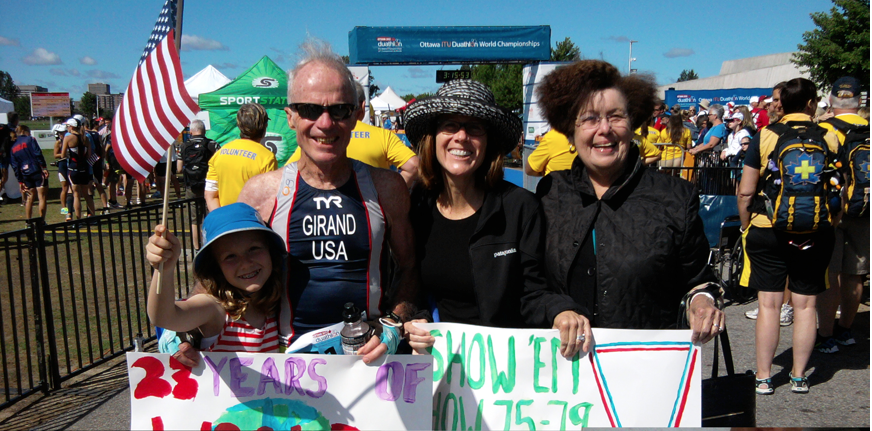Submitted on August 28, 2013

Like many men who undergo prostate cancer surgery, Jim Girand was eager to resume the sports he had enjoyed before his diagnosis in 2006. In his case, it was competing in international duathalons—events that combine distance running and bicycling. Girand had been a duathlete since 1991, but earned his first international medal the year after undergoing a radical prostatectomy at UCSF. He won silver in the 2007 world long course followed by a bronze in the Olympic distance event in Spain in 2011. This August he brought home a gold medal for the 2013 Olympic distance duathalon held in Ottawa, Canada. It’s the 23rd consecutive world competition he has entered.
Girand credits much of his athletic success to hard work and use of the latest training technology. He took a similar systematic approach in dealing with his prostate cancer. When he learned in 2006 that he had an aggressive form of the disease, “I became a student of the diagnosis and treatment of prostate cancer,” said Girand. Over the following weeks, Girand, who is a consultant and investor in high technology companies, talked to major medical centers around the country to educate himself about his treatment options.
Impressed with UCSF’s combination of surgical excellence, advanced technology and a compassionate health care team, Girand underwent a radical prostatectomy at UCSF, performed by UCSF Urology Chair Dr. Peter Carroll. Girand healed quickly with minimal side effects. Dr. Carroll, himself a cyclist, allowed Girand to get back on his bike two months after his surgery, and with careful supervision he began his reconditioning program.
When regular monitoring suggested a recurrence of his disease, he had follow-up radiation in 2010 with UCSF radiation oncologist Alexander Gottschalk, MD, PhD. Girand knows that monitoring his cancer recovery will be an ongoing part of life—all the more reason to be comfortable with your treatment team, he believes.
“You’re entering into a relationship when you have prostate cancer treatment,” says Girand. “It’s not a one-time transaction.”
Making thoughtful treatment decisions is so important in Girand’s opinion that he created a website after his surgery (prostatecancerpatients.org) to help other men navigate the process. The site receives about 500 hits each month, many from repeat visitors. Girand updates it regularly with diagnostic and treatment news, support resources, and survivor’s stories.
“It’s important to seek out the best possible treatment if you suspect prostate cancer. You need to become a partner in the whole process. Take charge, ask lots of questions, and then draw your own conclusions,” said Girand.